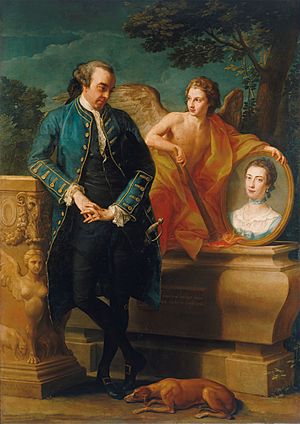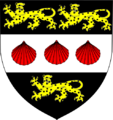Wills Hill, 1st Marquess of Downshire facts for kids
Quick facts for kids
The Most Honourable
The Marquess of Downshire
|
|
|---|---|
 |
|
| First Lord of Trade | |
| In office 9 September 1763 – 20 July 1765 |
|
| Monarch | George III |
| Prime Minister | George Grenville |
| Preceded by | The Earl of Shelburne |
| Succeeded by | The Earl of Dartmouth |
| In office 16 August – December 1766 |
|
| Monarch | George III |
| Prime Minister | The Earl of Chatham |
| Preceded by | The Earl of Dartmouth |
| Succeeded by | The Viscount Clare |
| In office 20 January 1768 – 31 August 1772 |
|
| Monarch | George III |
| Prime Minister | The Earl of Chatham The Duke of Grafton Lord North |
| Preceded by | The Viscount Clare |
| Succeeded by | The Earl of Dartmouth |
| Secretary of State for the Colonies | |
| In office 27 February 1768 – 27 August 1772 |
|
| Monarch | George III |
| Prime Minister | The Earl of Chatham The Duke of Grafton Lord North |
| Preceded by | New office |
| Succeeded by | The Earl of Dartmouth |
| Secretary of State for the Southern Department | |
| In office 24 November 1779 – 27 March 1782 |
|
| Monarch | George III |
| Prime Minister | Lord North |
| Preceded by | The Viscount Weymouth |
| Succeeded by | Office abolished |
| Personal details | |
| Born | 30 May 1718 Fairford, Gloucestershire |
| Died | 7 October 1793 (aged 75) |
| Nationality | British |
| Spouses | (1) Lady Margaretta FitzGerald (d. 1766) (2) Mary Stawell (1726–1780) |
Wills Hill, 1st Marquess of Downshire (born May 30, 1718 – died October 7, 1793) was an important British politician. He lived during the Georgian era, a time when kings named George ruled Great Britain.
He was known by different titles throughout his life. From 1742 to 1751, he was called The 2nd Viscount Hillsborough. Then, from 1751 to 1789, he was The 1st Earl of Hillsborough. Finally, he became The 1st Marquess of Downshire.
In North America, many people remember him as the Earl of Hillsborough. He held a key job as the Secretary of State for the Colonies from 1768 to 1772. This was a very important time, leading up to the American War of Independence.
Contents
Early Life and Family
Wills Hill was born in Fairford, a town in Gloucestershire, England. His father was Trevor Hill, 1st Viscount Hillsborough. His mother was Mary, the daughter of Anthony Rowe. Wills was named after his godfather, General Sir Charles Wills.
Starting a Political Career
Wills Hill began his political journey in 1741. He was elected to the British Parliament to represent the area of Warwick. He kept this seat until 1756.
In May 1742, he inherited his father's title and became The 2nd Viscount Hillsborough. This was an Irish peerage, which meant he could still be a member of the British House of Commons. In the same year, he was given important roles in County Down, Ireland. He became the Lord Lieutenant of County Down and the Custos Rotulorum of County Down. These roles involved representing the King and keeping records.
Gaining More Titles
As his career grew, Wills Hill received more titles. In 1751, he was made the Earl of Hillsborough in the Irish peerage. This was a higher noble title.
In 1754, he became the Comptroller of the Household. This job involved managing the royal household's finances. He held this position until 1756. He also became a Privy Counsellor. This meant he was a trusted advisor to the King.
In 1756, he received a new title in the Peerage of Great Britain. He was made Baron Harwich. This new title gave him a seat in the House of Lords, the upper house of the British Parliament.
Important Government Roles
Wills Hill held several important government jobs. From 1763 to 1765, he was the President of the Board of Trade and Plantations. This board managed trade and colonies for Great Britain. He served under Prime Minister George Grenville.
After a short break, he returned to the same role in 1766. He also served as a joint Postmaster General. This job involved overseeing the postal service.
Secretary of State for the Colonies
From 1768 to 1772, Wills Hill held a very important position. He was the Secretary of State for the Colonies. This role meant he was in charge of managing Great Britain's colonies, especially those in America. During this time, he also continued as President of the Board of Trade.
Wills Hill strongly disagreed with giving American colonists more freedom. He believed in keeping strict control over them. However, he did support the idea of uniting England and the Kingdom of Ireland.
When he retired in 1772, he received another title. He was made Earl of Hillsborough in the Peerage of Great Britain.
Later Roles and Final Title
In 1779, he became the Secretary of State for the Southern Department. This role involved managing foreign affairs for southern Europe and the colonies. He held this position until 1782. He was the last person to have this job, as the government reorganized how Secretaries of State worked.
In 1789, he received his highest title. He was made Marquess of Downshire in the Irish peerage.
Family Life
Lord Downshire was married twice. His first wife was Lady Margaretta FitzGerald. They married in 1747. She passed away in 1766.
In 1768, he married his second wife, Mary Bilson-Legge. She was the daughter of Edward, 4th Baron Stawell. Mary passed away in 1780.
Lord Downshire died on October 7, 1793, when he was 75 years old. His son from his first marriage, Arthur, took over his titles.
Legacy and Namesakes
Wills Hill, the Marquess of Downshire, is remembered in many places. Several locations in the United States were named after him:
- Hillsborough County, New Hampshire
- Hillsborough Township, New Jersey
- The town of Hillsborough, New Hampshire
- The town of Hillsborough, North Carolina
- Hillsborough County, Florida
- Hillsborough, California was indirectly named after him.
In Canada, two places were also named in his honor:
- Hillsborough Bay on Prince Edward Island
- The village of Hillsborough, New Brunswick
Images for kids
 | William Lucy |
 | Charles Hayes |
 | Cleveland Robinson |



